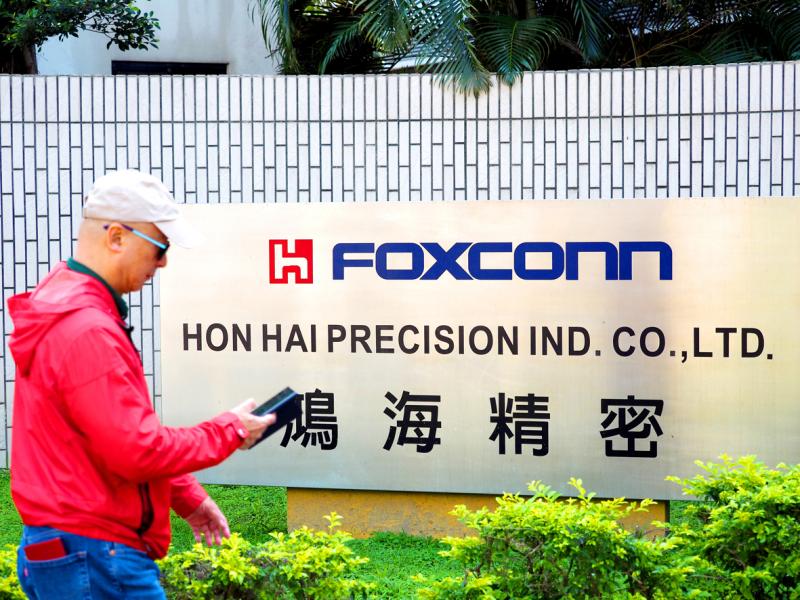Hon Hai Precision Industry Co (鴻海精密) yesterday said net profit last year fell 10.66 percent to NT$115.31 billion (US$3.81 billion), its third consecutive year of decline and the lowest in about six years.
Net profit in 2018 was NT$129.07, a financial statement from Apple Inc’s largest iPhone assembler showed.
Earnings per share rose to a three-year high of NT$8.32, due to a 20 percent reduction in share capital.

Photo: David Chang, EPA-EFE
Consolidated revenue inched up 0.93 percent on an annual basis to NT$5.34 trillion, a record high, but gross margin dipped 0.36 percentage points to 5.91 percent.
Hon Hai, which makes about 50 percent of its net profit in the fourth quarter each year, saw last quarter’s profit fall 23.71 percent year-on-year to NT$47.77 billion, while revenue contracted by 3.87 percent to NT$1.74 trillion, which it blamed on lower-than-expected sales of electronic components.
Hon Hai chairman Young Liu (劉揚偉) earlier this month predicted a 15 percent drop this quarter in sales across business segments from the fourth quarter as the COVID-19 crisis affected the firm’s production in China.
Production is expected to be back on track in the second quarter, Liu said, adding that annual revenue growth was expected to be between 1 and 3 percent.
Burdened since last year by rising US duties on its made-in-China products, Hon Hai, known as Foxconn Technology Group (富士康科技集團) outside of Taiwan, has posted single-digit annual growth in monthly revenue since June, while reporting double-digit declines in sales over the past three months amid the coronavirus outbreak.
Hon Hai founder Terry Gou (郭台銘) has voiced concerns over weakening market demand as COVID-19 spreads in the US as well as disruptions across supply chains in Japan and South Korea.
To diversify its production risks, Hon Hai has increased investments in Vietnam by US$25.1 million.

Shiina Ito has had fewer Chinese customers at her Tokyo jewelry shop since Beijing issued a travel warning in the wake of a diplomatic spat, but she said she was not concerned. A souring of Tokyo-Beijing relations this month, following remarks by Japanese Prime Minister Sanae Takaichi about Taiwan, has fueled concerns about the impact on the ritzy boutiques, noodle joints and hotels where holidaymakers spend their cash. However, businesses in Tokyo largely shrugged off any anxiety. “Since there are fewer Chinese customers, it’s become a bit easier for Japanese shoppers to visit, so our sales haven’t really dropped,” Ito

The number of Taiwanese working in the US rose to a record high of 137,000 last year, driven largely by Taiwan Semiconductor Manufacturing Co’s (TSMC, 台積電) rapid overseas expansion, according to government data released yesterday. A total of 666,000 Taiwanese nationals were employed abroad last year, an increase of 45,000 from 2023 and the highest level since the COVID-19 pandemic, data from the Directorate-General of Budget, Accounting and Statistics (DGBAS) showed. Overseas employment had steadily increased between 2009 and 2019, peaking at 739,000, before plunging to 319,000 in 2021 amid US-China trade tensions, global supply chain shifts, reshoring by Taiwanese companies and

Taiwan Semiconductor Manufacturing Co (TSMC, 台積電) received about NT$147 billion (US$4.71 billion) in subsidies from the US, Japanese, German and Chinese governments over the past two years for its global expansion. Financial data compiled by the world’s largest contract chipmaker showed the company secured NT$4.77 billion in subsidies from the governments in the third quarter, bringing the total for the first three quarters of the year to about NT$71.9 billion. Along with the NT$75.16 billion in financial aid TSMC received last year, the chipmaker obtained NT$147 billion in subsidies in almost two years, the data showed. The subsidies received by its subsidiaries —

Taiwan Semiconductor Manufacturing Co (TSMC) Chairman C.C. Wei (魏哲家) and the company’s former chairman, Mark Liu (劉德音), both received the Robert N. Noyce Award -- the semiconductor industry’s highest honor -- in San Jose, California, on Thursday (local time). Speaking at the award event, Liu, who retired last year, expressed gratitude to his wife, his dissertation advisor at the University of California, Berkeley, his supervisors at AT&T Bell Laboratories -- where he worked on optical fiber communication systems before joining TSMC, TSMC partners, and industry colleagues. Liu said that working alongside TSMC